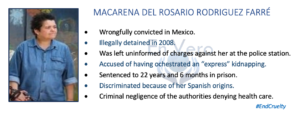Source: La Silla Rota
Authors: Alejandro Melgoza, Sandra Romandia, Paris Salazar
April 5, 2020 (Original publication in Spanish on August 11, 2019)
Translation: J. Bravo
Edomex: factory of culprits
The simulation of justice, files put together with planted evidence and false culprits were practices of the government of Eruviel Ávila in the State of Mexico, where today there are more than 3,000 complaints against trial judges and 78 superior state court judges.
Over a seven-year period (2011-2018), innocent people were imprisoned in the State of Mexico to improve the official image. The police arrested people without warrants and tortured them. Assistant prosecutors assembled files with planted evidence and judges convicted them without any witnesses. Those false culprits have been released from prison, slowly. Inside the prisons there are groups of prisoners who defend themselves against abuse. This happened especially during the government of Eruviel Ávila. So far, there have been more than 3,000 complaints against judges and 78 against state court judges.
A journalistic investigation was conducted by the La Silla Rota news portal team: This project was one of the four winners of the Investigation Journalism Scholarship on Corruption in the Judiciary, launched by Mexicanos contra la Corrupción y la Impunidad (MCCI) in 2018.
On the afternoon of July 24, 2014, bricklayers Isidro Rivero, Alejandro Sánchez and Daniel Ramos were inside their house located in the municipality of Nezahualcóyotl, when military personnel, as well as state and municipal police officers from the Mixed Operations Base (BOM) busted the door down.
Once inside, they began beating them while accusing them of belonging to the Michoacan family cartel; Alejandro tried to resist, but the uniformed men subdued him and, with a barrel of a military rifle, repeatedly raped him.
Then they were brought to the Public Prosecutor’s Office to accuse them of having robbed with violence a senior citizen and carrying a firearm. Then, they took a picture of them that was disseminated through the media.
“Three members of the Michoacan family are arrested,” read the newspaper headlines accompanied by a photograph that showed them holding a gun, which later became known, it was planted when they were captured.
Then, according to the statements by the detainees at the Prosecutor’s Office, under the instructions of the then-prosecutor of Nezahualcóyotl, Mauricio Blancas, they were tortured to get them to admit that they were part of the criminal group.
The blows fractured Isidro Rivero’s ribs and he was taken to Gustavo Baz hospital in Tlalnepantla. The Human Rights Commission of the State of Mexico (CODHEM) certified the injuries.
Months later, the three detainees were released after their defense lawyer, Montes Leal Santos, proved during the trial that they were tortured, and that the evidence presented by the then-Attorney General’s Office of the State of Mexico (PGJEM), now the Prosecutor’s Office, was false.
Not only that, but Judge David Virgen Adriano accepted the evidence presented by the Prosecutor’s Office of the State of Mexico to have them jailed in the Neza-Bordo prison.
These stories are not isolated. An investigation carried out by La Silla Rota as part of the Investigation Journalism Scholarship on Corruption in the Judiciary, launched by Mexicans against Corruption and Impunity (MCCI), analyzed 25 judicial files, official statistics and testimonies, where it was found that during the administration of the governor of the State of Mexico, Eruviel Ávila Villegas, false culprits were fabricated in collusion with the local Judicial Power, who tried and convicted them without any evidence.
The motive: increase the number of convictions to raise efficiency rates and defend the progress of his government in public security.
“The average effectiveness at trial that I am ready to accept is 80 percent, nothing less. Out of 10 cases, you have to win eight and lose two … Are the crimes false? It has always been like that, man!” demanded Fernando Ulises Cárdenas, then the legal central prosecutor of the Attorney General’s Office of the State of Mexico, from his subordinates in a video that was leaked on November 21, 2015.
The request made by Ulises Cárdenas, an employee of Eruviel Ávila, regarding losing two out of 10 cases, was not far from reality. This journalistic investigation found that on average 7 out of 10 cases prosecuted between 2011 and 2017, ended in convictions and only three in acquittals.
In other words, 70 percent of the detainees of the State of Mexico who had judicial proceedings opened against them was sentenced and serves time in prison.
Statistics from this period reveal that out of the 26,542 trials that had a judgment, 82.6 percent were convictions and 16.2 percent acquittals, that is, only 4,246 people were released.
Symptom of the above is the cascade of complaints for acts of corruption, omission, pressure, manipulation, irregularities in due process, inappropriate treatment, administrative failures, among others, in which 3,291 complaints against trial judges and 78 against superior state court judges were started during the 2011-2018 period, according to information provided by the Judicial Branch of the State of Mexico through requests for access to information.
How are culprits manufactured?
Through the analysis of 25 judicial files, as well as more than thirty interviews with investigative police, assistant prosecutors, lawyers, staff who worked in the state prosecutor’s office and the Judiciary, it was found that the Public Prosecutor’s Office used five methods to manufacture culprits: manipulation of witnesses and their absence, torture, bribery as a retention measure, planting of evidence, and absence of scientific and technical evidence to support the accusations.
Those involved in these cases ended up in informal pretrial detention, which meant waiting for the judicial process and determination of the judge inside a jail.
To understand this problem, we must divide the responsibility into two parts: the Prosecutor’s Office and the Judiciary. The first one—previously the Attorney General’s Office dependent on the state government and since 2016 an independent prosecutor’s office—manufactured the cases from the Public Prosecutor’s Office. The second one, the Judicial Power, endorsed them, that is to say, it considered the evidence presented by the Public Prosecutor’s Office despite the irregularities in the files.
This happened despite the fact that during the period in which Institutional Revolutionary Party (PRI)’s Eruviel Ávila was governor the New Criminal Justice System was implemented in Mexico. The objective was for the Public Prosecutor’s Office to present scientific and technical evidence to support its accusations. The judges would have to consider the defendant innocent until proven otherwise, the so-called “presumption of innocence.”
But the statistics compiled by La Silla Rota demonstrate the opposite: during the period in which Eruviel Ávila was governor, the Judiciary has indicated that they did not have any record in which evidence from the Public Prosecutor’s Office had been rejected, according to their responses through requests for access to information.
According to the 25 judicial files analyzed by La Silla Rota, which include 44 detainees, in a hundred percent of the cases the agents who arrested them did not identify themselves during the arrest. Another pattern found is that, in 64 percent of cases, the “absence of witnesses” was recurrent during the hearings; that is to say, that the accusing party did not show up, and in spite of this, the judicial process against the detainee continued. The files also showed that in 40 percent of the cases, the detainees reported being victims of torture to plead guilty, and that the authorities asked them to admit belonging to a criminal organization.
La Silla Rota also found, based on file reviews, that in 30 percent of the cases there was no arrest document or warrant against the detainees. In at least 25 judicial files, that is, 60 percent of the cases, the defendants reported the planting of evidence, mainly weapons.
For all these failures, cases were dropped; 26 out of the 44 who endured pretrial detention were released. According to the files more than 60 percent of the inmates were jailed for more than a year but in subsequent hearings they demonstrated their innocence and were released.
According to requests of information from the Prosecutor’s Office of the State of Mexico: 1,181 agents of the local prosecutor’s office were reported by citizens for administrative and investigative irregularities. Year after year they increased: in 2011 there were 64 files; 88 in 2012; 100 in 2013; 145 in 2014; 187 in 2015; 159 in 2016 and 438 in 2017.
Currently, Fernando Ulises Cárdenas Uribe, the official of the Prosecutor of the State of Mexico that in a video demanded his employees to invent crimes to the detainees, continues to be a legal central prosecutor with the now PRI governor, Alfredo del Mazo.
And not only that: in response to a request for access to information, the Attorney General’s Office of the State of Mexico confirmed to La Silla Rota that there is no administrative or investigative procedure against Fernando Ulises Cárdenas for admitting to a group of employees that crimes were fabricated.
The State of Mexico judicial family
Between 2011 and 2017, when he was Governor Eruviel Ávila, in the Judiciary of the State of Mexico were appointed officials whose career was forged within the Institutional Revolutionary Party (PRI), and who also held positions during the administration of the ex-president.
The hand of the state executive was perceived in the Judiciary: the last three appointments of members of the Council of the Judiciary of the State of Mexico were more a political move than an election of an autonomous power.
In the election of three councillors, a “castling” move was made between state secretariats and profiles with little judicial trajectory were promoted, but all linked to Eruviel Ávila. Right from the cabinet of Eruviel was appointed Joel Alfonso Sierra Palacios, who from 2011 to 2012 was deputy secretary of legal affairs of the Government of the State of Mexico and in 2013 he became counsellor of the Judiciary.
The same happened to Otoniel Campirán Pérez, who had worked in the Office of the Federal Attorney for Labour Defense from 2011 to 2012 and from 2014 to 2015; that year he became advisor of the State of Mexico judiciary.
Another case is that of Marco Antonio Morales Gómez, who was appointed advisor to the Electoral Institute of the State of Mexico. His appointment in 2008, was promoted in the State of Mexico congress by the leader of the PRI bench, the then-deputy Eruviel Ávila. In 2015 he was also appointed advisor to the local judiciary.
In the review of the files, it was found that the judges who convicted or determined the informal custody of false culprits were: Nabor Rigoberto Martínez, Petra Alcántara, Rocío Salinas, Miguel Ángel Coca, Maya Julián, Apollino Blanco, Bertha Araceli Díaz, Janelly Gutiérrez, Julio César Orihuela, Armando Osorio, Israel Chávez, Francisco Munguía, Gildardo Fernández, Maximiliano Vázquez, Mónica Mellado Tapia and Monica Osorio.
The judicial districts that accumulated these inconsistencies were Ecatepec, Naucalpan, Chalco and Texcoco. In these districts, the judges validated 93.7 percent of the files maintained only with testimonial evidence obtained by the Public Prosecutor’s Office during the hearings under the New System. The judges—for their part—only allowed 3.3 percent of the false culprits to continue their proceedings out of prison.
In the cases consulted for this journalistic investigation, there were five amparos (orders for court protection) where federal judges demonstrated that local judges made mistakes and irregularities. In these files, the “false culprits” received protection.
In two proceedings, they revoked the accusations of local judges, because the Public Prosecutor’s evidence did not prove that they were guilty. In two more, the sentences were reduced and in another the proceeding was reinstated.
One of them was that of seven community members from Salazar, in Lerma, who were imprisoned after opposing a commercial project in 2016. The evidence was so weak that, recently before an amparo, they were released and presented as political prisoners by Alejandro Encinas’s team before President Andrés Manuel López Obrador.
Another of the notorious amparos was the one filed by the inmate José Humbertus Espinoza, after the president of the Edomex Superior Court of Justice, Sergio Medina Peñaloza, appointed in 2017 two judges as substitute magistrates to resolve his case, without any explanation whatsoever. In that case of amparo, file No.155/2017, federal judges Roberto Dionisio Pérez Martínez, Antonio Legorreta Segundo and Rubén Arturo Sánchez Valencia concluded that his fundamental right to a due criminal process was “violated” based on article 42 section V of the Judicial Power’s Organic Law.
For Humbertus that designation was a reprisal for becoming an unpleasant voice from the Chiconautla prison in Ecatepec. Inside the jail, he would give legal advice and hundreds of inmates protested during the hearings because their rights were not being respected.
The union between the inmates resulted in a collective amparo led by Humbertus himself, and although it was not resolved in his favour, it became a historical resource because it brought together hundreds of inmates who reported violations of due process and the presumption of innocence, in addition to torture.
Now Humbertus leads the movement called Presunción de Inocencia y Derechos Humanos [Presumption of Innocence and Human Rights]; the collectives Hazme Valer [Make Me Count], led by the former prisoner Professor Oscar Neri, and Pena sin Culpa [Guiltless Punishment] by lawyer Aribel García are also active; and the aggrieved towns of community landholders and indigenous people such as Salazar, San Pedro Tlanixco and Atenco. These are the judicial revolutions that have sprouted and only ask that jails in the State of Mexico not to be occupied by innocents.
Perception of insecurity in crisis
When in November 2015, the video appeared on social networks where state prosecutor Fernando Ulises Cárdenas asked the assistant prosecutors to increase the average number of closed cases, even if there were innocent victims, the state of Mexico was experiencing a crisis, according to three different sources: the National Public Security System (SNSP), the National Institute of Statistics and Geography (INEGI) and the Institute of Legislative Studies of the State of Mexico (INESLE).
The kidnappings doubled between the first and fifth year of the administration of Eruviel Ávila: between 2011 and 2012, the reported cases were 116. Meanwhile, between 2015 and 2016 there were 233 kidnappings, according to SNSP data. On the other hand, between September 2015 and November 2016—just when the state prosecutor’s video was leaked—2,080 intentional homicides were reported, the highest amount compared to the previous five years, according to the same source of information.
In 2014, Javier Martínez Cruz, a specialist of the Institute of Legislative Studies (INESLE) declared that during the government headed by Eruviel Ávila the State of Mexico endured the highest figures in some crimes at the national level such as kidnapping, vehicle theft, human trafficking and gender violence.
“During 2012 there were 269,116 crimes; in 2013 there was an increase of 0.39 percent with 270,180, and so far in 2014 there have been 42,77 crimes, representing 16.49 percent nationwide.”
In 2016, the National Institute of Statistics and Geography (INEGI) placed the State of Mexico— for the second consecutive year—with the worst rating regarding the perception of insecurity among citizens.
But 12 days before the end of the six-year term, the situation had already changed. At least that is what Eruviel Ávila said on September 3, 2017. According to his figures, the State of Mexico was already one of the four states with the greatest capacity to meet the demands for public insecurity; they managed to close 71 out of every 100 investigative files. An average very close to what his state prosecutor demanded two years earlier, at the cost of apprehending even the innocent.
“We need to do a lot for the security of the State of Mexico, but we must recognize the efforts of the police corporations for working as a team to reduce the incidence of crime,” he said hours before handing over the government to his political party partner, Alfredo del Mazo. Now, Eruviel Ávila is a senator for the PRI.




